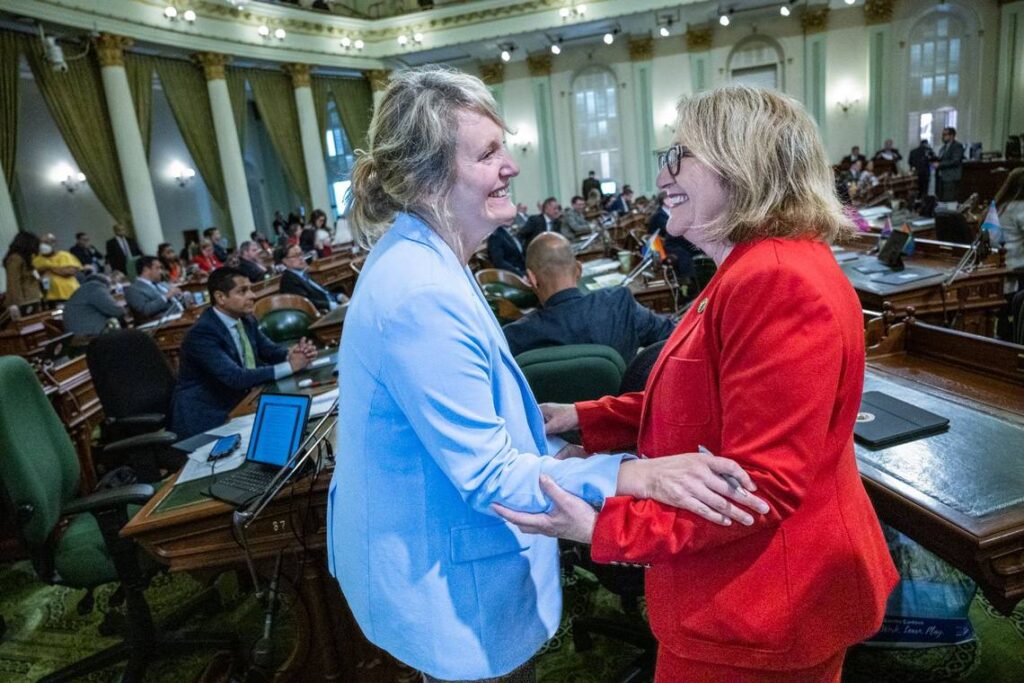In less than two weeks, California Journalism Protection Bill 886 is scheduled to be heard in the Senate Judiciary Committee.
The bill resurfaced this week with changes intended to make it more palatable to critics, including the tech industry, which would impose a tax on news links shared on their platforms. Big tech companies continue to voice their dissatisfaction with the bill.
AB 886 is scheduled to come up in committee on June 25th.
Google and Meta, the primary targets of the bill, declined to comment to The Bee, but NetChoice, the group that represents the companies, issued a statement on Tuesday.
Carl Szabo, vice president and general counsel of NetChoice, said the bill would be bad not only for the tech industry he represents, but for press freedom itself.
“AB 886 puts press freedom in California at risk. If passed, it will undoubtedly put journalists under new financial pressure from government officials and politicians to report favorably or lose funding, further eroding public trust in the news media,” Szabo said in a prepared statement.
Brittney Barsotti of the California Newspaper Publishers Association said NetChoice is making “misleading” arguments about the bill.
What does AB 886 do?
If AB 886 becomes law, tech companies like Google and Meta would have to pay for news links that appear on their platforms.
The bill applies to companies with online platforms that have more than 50 million monthly users in the United States, a market capitalization of more than $550 billion, and more than 1 billion users worldwide.
The bill would require companies to either enter into arbitration with California news organizations to agree on journalism fees or pay directly into a fund that is distributed to news organizations based on the number of reporters they employ. The bill explicitly states that payments should only be made to reporters who are employed for the specific purpose of covering news in California.
To avoid criticism that the bill only benefits billionaire media moguls, 1% of the funds raised will be distributed specifically to smaller news organizations, including many ethnic media outlets, on top of the funding they already receive.
News organisations would be required to devote 70% of their budgets to paying journalists and other staff – that threshold would drop to 50% for publications with five or fewer employees – and would be allowed to consider freelancers and part-time workers employees for the purposes of the bill.
What NetChoice Says
In a statement, Szabo warned that AB 886 would take away the power of independent news organizations.
“Through AB 886, California's government will make news organizations dependent on government assistance and undermine the independence and credibility of California-based news organizations,” he said.
He added that free access to news online and on social media will be significantly reduced, mainly as platforms such as Google and Facebook remove news links from their sites, predicting “an increase in cronyism.”
The NetChoice release contained several inaccuracies.
-
AB 886 states that freelancers are not recognized as employees for purposes of the bill. While this is true for larger publications, organizations with five or fewer employees can count freelancers as employees for purposes of the bill.
-
The announcement claims the bill would affect sites like Reddit and Pinterest, but the bill's language doesn't target either company.
-
The bill would create a new Government Claims Administrator to determine which media organizations are and are not. The bill does not create a new position, and it is the law, not the Claims Administrator, that determines which media organizations are eligible.
-
The statement said the bill would not increase journalists' salaries, noting that “the money that news organizations receive is ultimately fungible,” but it does include language requiring participating news organizations to publish reports on how the money they receive is being spent.
What supporters say
The Bee reached out to Rep. Buffy Wicks, D-Oakland, the author of the bill, AB 886, but did not hear back by deadline.
Barsotti said the bill includes “strict reporting requirements” for news organizations to prevent them from simply shifting funds around.
She disputed the argument that AB 886 would make the media subservient to the government.
“Our bill simply creates a table that platforms and publishers must follow,” she said.
She added that the government is stepping in to create a seat at the negotiating table because of the power of tech companies and their refusal to otherwise sit at the table.
“All the government is doing is saying, 'The powerful parties should come to the negotiating table.'”
San Fernando Valley Sun/El Sol Publisher Martha Diaz Askenagy released a statement saying AB 886 was designed to support publications like hers. She disputed Szabo's assertion that the bill is a threat to press freedom.
“As a publisher of a local ethnic publication, I can say with complete confidence that the most serious threat to press freedom is huge monopolies like Google, who exploit the work of our hard-working editorial staff without paying our journalists a penny for their content,” she said.
McClatchy, parent company of the Sacramento Bee, Fresno Bee, Modesto Bee, San Luis Obispo Tribune and Merced Sun-Star, supports AB 886.

